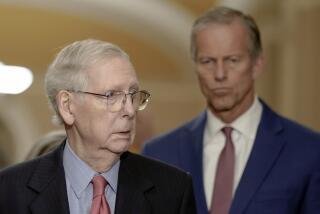Resurrecting the moderate Republican
Sixty years ago last month, I watched my parents pull the curtains of their voting booths in a Michigan town hall basement to vote for the man who lost the 1948 presidential election. He was Thomas E. Dewey, a Republican widely expected, even by the Democrats, to vanquish wounded incumbent Harry S. Truman.
Nearly all we remember about Dewey today is that he lost, and that an exuberant Truman was photographed brandishing a newspaper bearing the premature headline “Dewey Defeats Truman.” Dewey lost because he was so sure he would win that he ran a lackluster campaign, and because he lacked Truman’s hometown magnetism.
He didn’t lose, however, because he was too conservative. Dewey was nearly as liberal as his Democratic opponent, and that wasn’t a problem for voters. Moderation was the national consensus then, which is why Dewey today seems more liberal than any of the 10 Republican hopefuls for president did in 2008.
I’m no longer the loyal young Republican I was at age 6, and I’m now glad Truman won. But even from a 21st century progressive’s point of view, Dewey wouldn’t have been a bad president. As governor of New York, he’d been a pioneer in fighting racial discrimination in employment. He believed in labor unions and in the separation of church and state. As a prosecutor in New York City, he took on organized crime, putting Murder Inc. on death row. He was tough -- a Humphrey Bogart liberal, you might say.
The Truman-Dewey race was about politics and issues and approaches, but not about ideologies. It’s been a long time since we’ve had a moderate-on-moderate race like that.
In 1960, John F. Kennedy and Richard M. Nixon were both moderates in their ways. But after Nixon lost to Kennedy in that close election, Republicans began to shift their thinking. A faction of the party, led by Barry Goldwater, moved far to the right and began tugging at the rest of the party to join in the shift. One sign of the movement’s success is that, by today’s standards, Goldwater seems almost moderate when compared with the ’08 GOP presidential contenders
The Economist recently said of the current GOP: “The party lost the battle for brains.” The question for the Republicans going forward should be: How can the party regain them? It’ll be a difficult task as long as the loudest Republicans keep pushing it further right. But all the party needs to do is reverse this direction; to acknowledge the intelligence and integrity of its moderate antecedents.
There was Abraham Lincoln, of course. And Teddy Roosevelt, our first eco-president, who offended the South by inviting a black man to a White House dinner. His successor, William H. Taft, has been termed a great conservative president, but he broke up more monopolies than TR ever did and once, as a staunch Unitarian, even denied the divinity of Jesus. What candidate, from either party, would dare do that today?
The reviled Herbert Hoover, late in his only term, turned against his Depression-era “purge the rot” Wall Street advisors and pioneered agencies such as the Reconstruction Finance Corp. His conversion came too late to save his reputation, let alone win him another term. But his creations were good enough to be maintained and built on by the New Deal.
Even Ronald Reagan, the most successful conservative president, was a pragmatist. As California governor, he raised taxes. As president, he negotiated arms agreements with what he termed the “evil empire.” And he was always willing to work with the folks on the other side of the legislative aisle.
That hasn’t been the case lately. During the Bill Clinton and early George W. Bush years, the increasingly ideological GOP waged a Talibanish war against Democratic representatives, making legislative decisions in closed party caucuses as though it was sure it would never again be in a minority. Huge amounts of political energy and opportunities were wasted on Whitewater and other propagandistic campaigns.
After decades of increasingly extreme ideologies, next time around, why don’t the Republicans just let their current moderates -- John McCain, Rudy Giuliani, Mitt Romney -- run as honest men? They might redefine their party around a genuine national consensus.
Some GOP stalwart might even dare to veer to the left of where Dewey stood 60 years ago. Of course, it might be said that Dewey lost. On the other hand, a similarly moderate Republican candidate came along four years later and won. Then he won again. That was Dwight D. Eisenhower.
Come to think of it, a self-proclaimed GOP moderate won in 2000. But he turned out to be George W. Bush.
Marc B. Haefele is a commentator for KPCC-FM (89.3) and writes for Citybeat and Nomada magazine of Buenos Aires.
More to Read
A cure for the common opinion
Get thought-provoking perspectives with our weekly newsletter.
You may occasionally receive promotional content from the Los Angeles Times.






